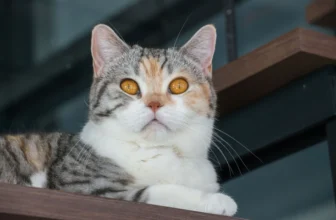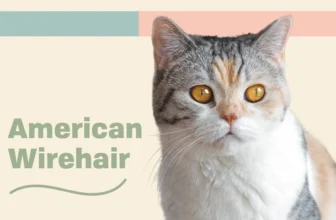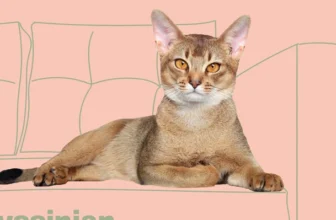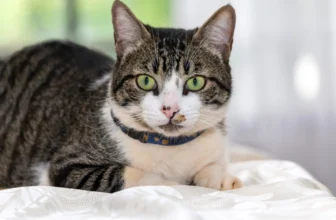If you’re a proud American Wirehair owner, chances are you want to give your feline companion the best life possible, including a healthy and balanced diet. But with health issues such as obesity, diabetes, urinary tract problems, and food allergies commonly affecting American Wirehairs, creating a proper meal plan can seem overwhelming. That’s why we’ve put together this comprehensive guide, complete with step-by-step instructions and expert advice, to help you create a balanced diet plan for your American Wirehair with health issues. With careful attention to nutritional requirements, dietary management, and other crucial factors, your furry friend can live a long and healthy life.
Nutritional Requirements of American Wirehairs
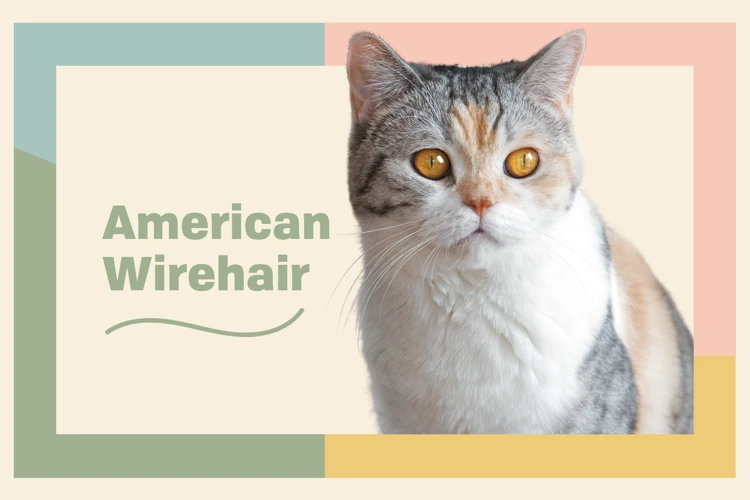
As a pet owner, it’s important to understand your pet’s nutritional requirements to maintain their overall health and well-being. American Wirehairs, like all cats, have unique dietary needs that must be met through a balanced and appropriate diet. Providing the right type of protein, fats, carbohydrates, vitamins, and minerals in their diet is crucial for their growth and development. In this section, we’ll explore the nutritional requirements of American Wirehairs and discuss how to ensure your cat is getting the nutrients they need to live a healthy life. For more information on raw versus commercial cat food for American Wirehairs, see our article on the benefits and drawbacks of feeding your American Wirehair different types of food.
Proteins
Proteins are essential for the growth, repair, and maintenance of your American Wirehair cat’s body tissues, including muscles, organs, and bones. They are made up of amino acids that your cat cannot produce on its own, making them an important part of your cat’s balanced diet plan.
When choosing protein sources for your American Wirehair’s diet, look for high-quality animal protein, such as chicken, turkey, or fish. These sources are easily digestible and provide your cat with essential amino acids for optimal health. It is important to note that some cats may have digestive issues with certain protein sources, so it is important to monitor your cat’s reaction to new foods.
In the table below, you can find examples of protein-rich foods for American Wirehairs:
| Protein Source | Protein Content | Benefits |
| Chicken | 28g per 100g of cooked chicken | Highly digestible, low in fat and calories, and a great source of essential amino acids. |
| Turkey | 25g per 100g of cooked turkey | Low in fat and calories, high in essential amino acids, and contains tryptophan, which promotes relaxation and helps reduce stress. |
| Salmon | 25g per 100g of cooked salmon | A great source of omega-3 fatty acids that help promote a healthy immune system, maintain healthy skin and coat, and reduce inflammation. Salmon also contains vitamin D, which promotes strong bones and overall health. |
| Eggs | 6g per large egg | Contain all essential amino acids, making them a complete protein source. Eggs are also rich in protein and easy to digest for most cats. |
It is important to note that while protein is essential for your American Wirehair, too much protein can also be harmful to their health. Consulting with a veterinarian can help determine the right amount of protein for your cat’s individual needs.
For more information on feeding American Wirehairs, check out our article on American Wirehair Diet and Protein.
Fats
Fats are an essential component of the American Wirehair’s diet, and they provide many benefits to their overall health. However, it is important to be mindful of the type and amount of fat in their diet. Healthy fats, such as omega-3 and omega-6 fatty acids, are important for their skin and coat health, as well as for brain and eye development.
Here are some fat-related tips to keep in mind when creating a balanced diet plan for American Wirehairs:
- Include healthy sources of fat such as fish, fish oil, flaxseed, and chicken fat in their diet.
- Avoid giving them excessive amounts of fat, as it can lead to weight gain and other health problems.
- Avoid giving them too many table scraps or human food high in fat, as it can disrupt their digestive system and potentially lead to pancreatitis.
It’s important to remember that American Wirehairs with health issues, such as obesity and diabetes, may require special dietary management that limits the amount of fat in their diet. Be sure to consult with a veterinarian to create the right meal plan that addresses their specific needs. To learn more about feeding American Wirehairs, check out this link: Benefits and Drawbacks of Feeding American Wirehairs.
Carbohydrates
Carbohydrates serve as one of the primary energy sources for American Wirehairs. It is important to note that not all carbohydrates are created equal. Some sources of carbohydrates, such as sweet potatoes and whole grains, are nutrient-dense and contain high levels of fiber, which can support digestive health. Other sources of carbohydrates, like processed foods and refined sugars, should be limited or avoided altogether.
To ensure that your American Wirehair receives the proper amount of carbohydrates in their diet, consider incorporating nutrient-dense sources like quinoa, brown rice, and barley. These sources of carbohydrates are also rich in vitamins and minerals such as B vitamins and magnesium, which are essential for overall health. Additionally, leafy green vegetables and legumes are excellent sources of carbohydrates that also provide additional nutrients like protein and fiber.
It is important to keep in mind that while carbohydrates do provide energy, overconsumption can lead to weight gain and potential health issues like diabetes and obesity. It is essential to monitor your cat’s carbohydrate intake, especially if they have health issues that require a low-carbohydrate diet.
To learn more about dietary management for American Wirehairs with obesity or diabetes, check out our articles on obesity and diet and diabetes and oral health.
A balanced diet rich in whole foods, including complex carbohydrates, can promote healthy skin and coat in American Wirehairs. To learn more about how nutrition affects skin and coat health in cats, read our article on Wirehair nutrition and skin & coat health.
Lastly, it is essential to avoid common feeding mistakes that can harm your cat’s health. To know more about such errors and mitigate their impact, check out our article on common feeding mistakes for American Wirehairs.
Incorporating nutrient-dense sources of carbohydrates into your American Wirehair’s diet can significantly improve their overall health and well-being. However, it is vital to monitor their carbohydrate intake and choose proper sources of carbohydrates to ensure their long-term health and longevity.
Vitamins and Minerals
American Wirehairs require a balanced diet rich in vitamins and minerals to maintain good health and prevent nutrient deficiencies. Here are some of the essential vitamins and minerals that should be present in your American Wirehair’s diet, along with their benefits:
| Vitamin/Mineral | Functions | Sources |
|---|---|---|
| Vitamin A | Essential for vision, skin, and immune system health | Liver, fish oils, egg yolks, and dark leafy greens |
| Vitamin E | Acts as an antioxidant that protects cells from damage and aids in immune system function | Vegetable oils (such as sunflower and safflower oil), egg yolks, nuts, and certain leafy greens |
| Vitamin D | Necessary for the absorption and use of calcium and phosphorus for bone growth and health | Fatty fish, egg yolks, and fortified dairy and cereal products |
| Vitamin B12 | Aids in the formation of red blood cells and proper nervous system function | Meat, fish, dairy products, and eggs |
| Calcium | Necessary for proper growth and maintenance of bones and teeth, muscle function, nerve transmission, and blood clotting | Dairy products, certain leafy greens, and fortified foods and beverages |
| Iron | Necessary for the formation of hemoglobin in red blood cells that carry oxygen throughout the body | Meat, poultry, fish, and some plant-based sources such as spinach and beans |
| Zinc | Necessary for immune system health, wound healing, and growth and development | Meat, fish, poultry, dairy products, and some plant-based sources such as beans and whole grains |
It’s important to note that over-supplementing with certain vitamins and minerals can lead to toxicity or other health issues. It’s important to consult with a veterinarian before adding any supplements to your American Wirehair’s diet. Feeding a nutritionally complete and balanced cat food formulated for your pet’s age, activity level, and any health conditions is the best way to ensure they receive all the essential vitamins and minerals they need.
Dietary Management for American Wirehairs with Health Issues
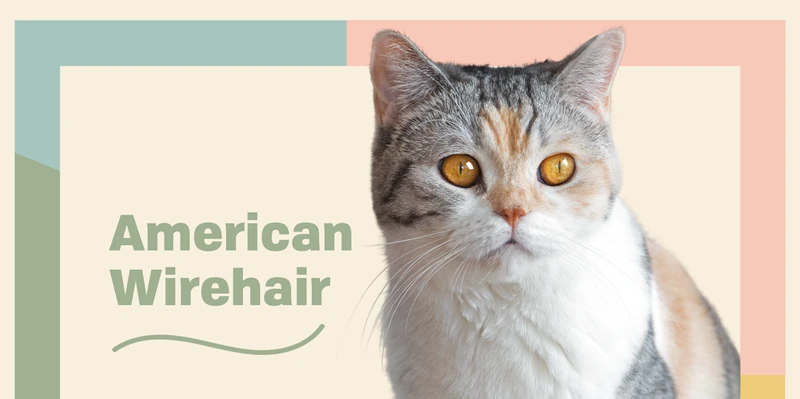
Maintaining a proper diet is essential for American Wirehairs with health issues. With their unique requirements, it’s important to provide them with specialized care and attention. Whether your American Wirehair is struggling with obesity, diabetes, urinary tract health, or food allergies, a balanced diet plan can help manage their condition and improve their overall health. In this section, we will explore the dietary management strategies that can be implemented to address the specific health concerns of your American Wirehair. Let’s dive in and discover the proper care your pet deserves!
Obesity
Excess weight or obesity is a common health issue that affects American Wirehairs. Obesity in cats can lead to many health problems such as diabetes, joint problems, heart disease, and even certain types of cancer. It’s important to manage their weight and prevent obesity from occurring in the first place.
Causes of Obesity
There are several reasons why American Wirehairs may become obese. These include overfeeding and lack of exercise. Feeding your cat too much food and not providing them with enough opportunities to exercise can lead to a calorie surplus and, in turn, obesity.
Signs of Obesity
When assessing your cat’s weight, you should use a body condition score chart or consult with a veterinarian. You can also look for signs of obesity such as a round, protruding belly or difficulty in walking due to excess weight.
Dietary Management for Obesity
If your American Wirehair is overweight or obese, it’s important to make changes to their diet to promote weight loss. This can involve reducing the amount of food you feed them and limiting treats or table scraps. Additionally, you can switch to a weight management or low-calorie cat food to help them lose weight.
Table: Recommended Daily Caloric Intake for American Wirehairs
| Weight of Cat (lbs) | Recommended Daily Caloric Intake |
|——————|———————-|
| 5 | 200 – 250 |
| 10 | 350 – 400 |
| 15 | 500 – 550 |
Exercise
Along with a healthy diet, exercise is crucial for managing your American Wirehair’s weight. Encourage them to play and engage in activities that will get them moving. This can include playing with feather toys or providing them with a cat tree to climb on.
Conclusion
Obesity is a serious health issue that can have long-term consequences for American Wirehairs. By managing their diet and providing them with opportunities for exercise, you can help your cat maintain a healthy weight and avoid obesity-related health problems in the future.
Diabetes
Diabetes is a condition that can affect American Wirehairs, just like it can affect humans. In diabetic animals, the body is unable to produce or use insulin, a hormone that helps regulate blood sugar levels. Diet plays a crucial role in the management of diabetes in cats.
Foods to Avoid: Foods high in carbohydrates should be avoided in cats prone to diabetes. This includes grains like wheat, corn, and rice. It is also important to avoid foods high in sugar such as candy or treats made for dogs and humans.
Foods to Include: A high-protein, low-carbohydrate diet is recommended for cats with diabetes. Consult with your veterinarian about wet or canned food options that have a low carbohydrate content. Foods such as boiled chicken or fish, or lean meats like beef or lamb are great sources of protein.
Portion Control: Cats with diabetes should have regulated mealtimes with measured portions. This helps control the amount of food intake and regulates blood sugar levels. An automatic feeder can aid in dispensing small, frequent meals throughout the day.
Supplements: Nutritional supplements such as Omega-3 fatty acids and fiber can also be added to the diet plan of cats with diabetes. Omega-3s have anti-inflammatory effects that can improve insulin sensitivity, while fiber reduces the absorption of carbohydrates in the digestive system.
| Foods to Avoid | Foods to Include | Portion Control | Supplements |
|---|---|---|---|
| Grains like wheat, corn and rice | High-protein, low-carbohydrate diet | Regulated mealtimes with measured portions | Omega-3 fatty acids and fiber |
| Foods high in sugar | Boiled chicken or fish, lean meats like beef or lamb | Small, frequent meals |
It is important to remember that the dietary management of cats with diabetes should be done under the guidance of a veterinarian. Blood glucose levels should be monitored regularly to assess the effectiveness of the diet plan. With the proper nutritional management and medication, many cats with diabetes can lead healthy and happy lives.
Urinary Tract Health
Cats, including American Wirehairs, are prone to urinary tract issues, which can be painful and potentially deadly if not addressed promptly. To prevent urinary tract infections, it is important to keep the urine at a proper pH level, maintain good hydration, and provide the necessary nutrients to support urinary tract health.
Below is a table of recommended nutrients for urinary tract health:
| Nutrient | Recommended Amount | Food Sources |
|---|---|---|
| Magnesium | Max. 20 mg/ 100 kcal | Whole grains, green vegetables, meat, fish |
| Calcium | Min. 0.6% DM | Dairy products, eggshell powder, bonemeal supplements |
| Phosphorus | Min. 0.5% DM | Meat, fish, eggs, dairy products |
| Taurine | Min. 0.1% DM | Meat, fish, supplements |
| Water | Provide fresh, clean water at all times | N/A |
It is important to note that it is not just the amount of these nutrients that is important, but the balance of them as well. A veterinarian can help determine the appropriate levels of these nutrients for your American Wirehair based on their individual needs and health history.
Additionally, it is important to encourage your cat to drink plenty of water to maintain good hydration. Provide multiple water sources throughout the house and consider adding a water fountain to encourage drinking.
Maintaining urinary tract health is crucial to keeping your American Wirehair healthy and happy. By providing the right nutrients and promoting good hydration, you can help prevent urinary tract issues and ensure your cat’s overall well-being.
Food Allergies or Intolerances
When it comes to American Wirehairs with food allergies or intolerances, creating a balanced diet plan can be tricky. The first step is to identify the specific ingredient that triggers the reaction, whether it is a protein source like chicken or beef, or a grain like wheat or corn.
Common symptoms of food allergies or intolerances include skin irritations, digestive problems, and even respiratory issues. In some cases, the symptoms may not appear immediately, making it difficult to pinpoint the cause of the reaction.
To help manage food allergies or intolerances in American Wirehairs, it is important to choose a high-quality, limited ingredient diet that excludes the specific allergen. Some pet food brands offer specialized formulas that are free of common allergens like chicken, beef, and grains.
Here is an example of a limited ingredient diet for American Wirehairs with food allergies or intolerances:
| Meal | Protein Source | Carbohydrate Source |
|---|---|---|
| Breakfast | Lamb | Sweet Potato |
| Lunch | Turkey | Lentils |
| Dinner | Duck | Peas |
Note: This is just an example and it is important to choose an appropriate diet based on the specific allergen identified by a veterinarian.
In addition to choosing the right food, it is important to monitor your American Wirehair for any signs of a reaction and to seek veterinary care if necessary. It may also be helpful to rotate between different protein and carbohydrate sources to minimize the risk of developing new allergies or intolerances.
Summary: Creating a balanced diet plan for American Wirehairs with food allergies or intolerances requires careful identification of the specific allergen and selection of a high-quality, limited ingredient diet. It is important to monitor for any signs of a reaction and seek veterinary care if necessary.
Creating a Balanced Diet Plan for American Wirehairs
Now that we understand the nutritional requirements of American Wirehairs, as well as their specific dietary needs for managing various medical conditions, it’s time to create a balanced diet plan that meets their unique needs. Proper diet planning for American Wirehairs requires a tailored approach that incorporates the right mix of proteins, fats, carbohydrates, and essential vitamins and minerals. In this section, we will explore the steps you can take to create a customized diet plan for your American Wirehair that promotes optimal health and well-being. Let’s get started.
Consulting with a Veterinarian
It is essential to consult with a veterinarian before creating a diet plan for your American Wirehair with health issues. Your veterinarian will be able to assess your pet’s health condition and provide you with expert recommendations on how to create a healthy and balanced diet plan that meets their specific nutritional requirements. Here are some key aspects to consider when consulting with a veterinarian:
1. Medical History: Provide your veterinarian with a complete medical history of your American Wirehair, including any past illnesses, surgeries, or medications they may have taken. This information will help your veterinarian understand your pet’s overall health and provide tailored dietary advice.
2. Current Health Condition: Your veterinarian will carefully examine your American Wirehair to assess their current health condition. They may perform blood tests and other diagnostic tests to determine any underlying health issues that may require specific dietary management.
3. Nutritional Requirements: Your veterinarian will provide you with recommendations on the appropriate amounts of proteins, fats, carbohydrates, vitamins, and minerals that your American Wirehair should consume. They will take into account your pet’s age, weight, activity level, and any health issues that may require special attention.
4. Choosing the Right Type of Food: Your veterinarian may recommend a specific type of food that is appropriate for your American Wirehair’s health condition. For instance, if your pet is overweight, they may recommend a low-fat or high-fiber diet.
5. Feeding Schedule: Your veterinarian will provide you with suggestions on the frequency and amount of food that your American Wirehair should consume. They will also advise you on how to measure portions and monitor your pet’s weight.
6. Special Nutritional Needs: If your American Wirehair has any special nutritional needs, such as food allergies or intolerance, your veterinarian will provide you with guidance on how to incorporate these needs into their diet.
By consulting with a veterinarian, you can ensure that you create a balanced diet plan that meets your American Wirehair’s nutritional needs and supports their overall health and well-being.
Choosing the Right Type of Food
Selecting the right type of food is crucial in ensuring that your American Wirehair leads a healthy life. It’s important to choose a food that meets all the nutrient requirements as per their health condition. When it comes to selecting food, there are a few things to consider such as:
| Considerations | Explanation |
|---|---|
| Age and life stage | The nutritional requirements of American Wirehairs vary depending on their age and life stage. Kittens require a different diet than adult cats, and pregnant or nursing cats have different dietary needs than those who are not. |
| Health conditions | Cats with health conditions such as obesity, diabetes, or urinary tract issues require a special diet to manage their condition. Consult with your veterinarian to determine the appropriate food for your cat. |
| Ingredients | Check the ingredients list to ensure that the food doesn’t contain any ingredients that your cat may be allergic to or intolerant of. Avoid food with fillers, artificial colors, and preservatives. Look for meat or fish as the first ingredient. |
| Brand reputation | Choose a food from a reputed brand that has a history of providing high-quality and nutritious food to cats. Research the brand’s reviews and ratings from other pet owners. |
| Wet vs. dry food | Consider whether to feed your cat wet or dry food, or a combination of both. Wet food provides more moisture which can be beneficial for cats with urinary tract issues. Dry food is convenient and can help maintain dental health, but can also lead to dehydration if your cat doesn’t drink enough water. |
Keep in mind that it may take a few trials to find the right type of food that works well with your American Wirehair’s taste preferences and health needs. Stay patient and work with your veterinarian to ensure that your American Wirehair receives a balanced and nutritious diet.
Scheduling Meals and Measuring Portions
Scheduling Meals and Measuring Portions
Scheduling meals and measuring portions are important factors in creating a balanced diet plan for your American Wirehair with health issues. Here are some general guidelines to follow:
| Health Issue | Number of Meals Per Day | Portion Size |
|---|---|---|
| Obesity | 2-3 small meals | Controlled portion size based on recommended daily calorie intake |
| Diabetes | 2-3 small meals | Controlled portion size based on recommended daily carbohydrate intake |
| Urinary Tract Health | 2-3 regular meals | Controlled portion size based on recommended daily protein intake |
| Food Allergies or Intolerances | 2-3 regular meals | Controlled portion size based on recommended daily nutrient intake |
For American Wirehairs with obesity, it is important to schedule 2-3 small meals per day with controlled portion sizes based on their recommended daily calorie intake. It is recommended to split their daily food intake into multiple smaller meals rather than one large meal to boost their metabolism and help them feel satiated. Similarly, for those with diabetes, it is important to schedule 2-3 small meals per day with controlled portion sizes based on their recommended daily carbohydrate intake.
For American Wirehairs with urinary tract health concerns, scheduling 2-3 regular meals a day with controlled portion sizes based on their recommended daily protein intake can reduce the risk of urinary tract infections. For those with food allergies or intolerances, scheduling 2-3 regular meals a day with controlled portion sizes based on their recommended daily nutrient intake can help alleviate their symptoms.
Keep in mind that every American Wirehair is unique, and their dietary needs may differ from these guidelines. Consult with a veterinarian to determine the best meal schedule and portion sizes for your furry friend based on their individual health needs. Measuring portions is also important to prevent overfeeding, weigh out the recommended amount of food on a kitchen scale, use measuring cups or spoons, or follow the feeding guidelines on the package.
By scheduling meals and measuring portions, you can ensure that your American Wirehair with health issues is receiving the right amount of nutrients to support their wellbeing and improve their quality of life.
Including Special Nutritional Needs into the Diet Plan
When creating a balanced diet plan for your American Wirehair, it’s crucial to consider any special nutritional needs that they may have, especially if they are dealing with health issues. Here are some special nutritional considerations that you may need to account for in your pet’s diet plan:
| Nutrient | Importance | Food Sources |
|---|---|---|
| Omega-3 Fatty Acids | Anti-inflammatory properties can help with arthritis and other inflammatory conditions. | Fatty fish, such as salmon and sardines, flaxseed, and chia seeds. |
| Glucosamine and Chondroitin | Help to support joint health and reduce inflammation. | Joint supplements or foods that contain animal cartilage, such as bone broth. |
| Taurine | Essential for heart health and vision. | Meat, fish, and poultry. |
| Fiber | Essential for digestive health and can help regulate blood sugar levels. | Fruits, vegetables, and whole grains. |
| Probiotics | Can help improve gut health and boost immunity. | Yogurt, kefir, and other fermented foods. |
It’s important to note that some of these special nutritional needs may not be necessary for every American Wirehair. Consulting with your veterinarian can help you determine which of these nutrients, if any, your pet may require in their diet. By including these special nutritional needs in your pet’s diet plan, you can help improve their overall health and wellbeing.
Providing Clean Fresh Water
One of the most important aspects of managing the diet and health of your American Wirehair is ensuring that they have access to clean and fresh water at all times. Proper hydration is essential for maintaining healthy organ function, promoting healthy skin and coat, and aiding in digestion.
Water Consumption Guidelines
The amount of water your American Wirehair needs will depend on their age, activity level, and overall health. As a general rule, cats should consume approximately 2.5 to 4.5 ounces of water per 5 pounds of body weight per day. This means that a 10-pound American Wirehair should consume 5 to 9 ounces of water daily.
Providing Clean and Fresh Water
To ensure that your American Wirehair is getting enough water, be sure to provide them with clean and fresh water every day. This can be achieved by:
| Action | Description |
|---|---|
| Change the water regularly | Old water can become stagnant and stale, so it is important to change the water in your cat’s bowl at least once a day. |
| Use a clean bowl | Be sure to clean your cat’s water bowl regularly with soap and hot water, rinsing thoroughly to remove any soap residue. |
| Provide multiple water sources | Having water available in multiple locations throughout your home can encourage your American Wirehair to drink more frequently. |
| Consider a water fountain | Some cats prefer to drink running water, so you may want to try a water fountain to encourage your American Wirehair to drink more water. |
By following these guidelines and ensuring that your American Wirehair has access to clean, fresh water at all times, you can help keep them healthy and hydrated.
Monitoring the Weight and Health Condition of Your American Wirehair
It is crucial to monitor the weight and health condition of your American Wirehair to ensure that the diet plan you established is effective. Creating a chart or table is an excellent way to keep track of their weight, food intake, and overall health condition. Regular weigh-ins and vet checkups will help identify any concerns promptly. Here’s an example of what a monitoring table could look like:
| Date | Weight (lbs) | Food Intake | Water Intake | Overall Health Condition |
|---|---|---|---|---|
| 01/01/2022 | 10.5 | 1/2 cup AM, 1/2 cup PM | 1 cup | Good, no concerns |
| 01/15/2022 | 10.2 | 1/2 cup AM, 1/2 cup PM | 1 cup | Coughing, brought to vet and diagnosed with respiratory infection |
| 02/01/2022 | 9.8 | 1/2 cup AM, 1/2 cup PM | 1.5 cups | Good, no concerns |
In this example, American Wirehair’s weight, food intake, water intake, and overall health condition are recorded every two weeks. Any changes in weight or condition are noted and brought to the attention of the veterinarian. Following this table will give you a quick glance of your cat’s progress to ensure that they are reaching their desired weight goals while maintaining optimal health.
It’s also worth mentioning that besides monitoring the weight and health of your American Wirehair, you should also pay attention to their energy levels, coat condition, and litter box habits. Any significant changes in any of these factors could be indicative of an underlying health issue. Regular veterinary visits and monitoring of their condition will give you the peace of mind that you’re doing everything you can to keep your furry friend healthy and happy.
Conclusion
In conclusion, creating a balanced diet plan for American Wirehairs with health issues requires careful consideration of their nutritional requirements as well as their specific health conditions. Providing the right balance of proteins, fats, carbohydrates, vitamins, and minerals is essential to their overall health and well-being.
It is important to consult with a veterinarian to determine any underlying health issues that may require special dietary management. Obesity, diabetes, urinary tract health, and food allergies or intolerances are just a few examples of health issues that may require a tailored diet plan.
Choosing the right type of food is also critical, whether it be a commercial brand or a homemade diet. Scheduling meals and measuring portions can help ensure that your American Wirehair is receiving the appropriate amount of food. Additionally, incorporating special nutritional needs into the diet plan, such as joint support or hairball control, can also benefit their health.
Providing clean and fresh water is also essential for your cat’s overall health, as dehydration can lead to a variety of health issues. And lastly, monitoring your American Wirehair’s weight and health condition can help catch any potential health concerns early on.
By following these steps and making adjustments as needed, you can create a balanced diet plan for your American Wirehair that meets their nutritional needs and supports their overall health and well-being.
Frequently Asked Questions
What are the common health issues faced by American Wirehairs?
American Wirehairs commonly face health issues such as obesity, diabetes, urinary tract problems, and food allergies or intolerances.
Why is a balanced diet important for American Wirehairs with health issues?
A balanced diet helps to maintain optimal health and prevent further complications in American Wirehairs with health issues. It also helps to manage their weight and improves their overall quality of life.
What are the essential nutritional requirements of American Wirehairs?
American Wirehairs require proteins, fats, carbohydrates, vitamins, and minerals in their diet for optimal health.
What percentage of protein, fat, and carbohydrates should be included in the diet plan for American Wirehairs?
The appropriate distribution of protein, fat and carbohydrates varies depending on the age, weight, activity level, and health of the American Wirehair. Ideally, the diet should consist of a minimum of 25% protein and 10% fat, while the remaining content should be carbohydrates.
Why is obesity a common health issue in American Wirehairs?
Obesity is a common health issue in American Wirehairs due to their sedentary lifestyle. Lack of physical activity combined with overfeeding and unhealthy eating habits are major contributing factors.
What are some common foods that trigger allergies or intolerance in American Wirehairs?
Common allergy-causing foods for American Wirehairs include dairy products, soy, corn, and wheat, while common food intolerance-causing foods include beef and fish.
Why is monitoring food portions important for American Wirehairs with health issues?
Monitoring food portions helps manage the caloric intake of American Wirehairs and ensures that they consume only the appropriate amount of food appropriate for their specific health condition.
What role does water play in the diet of American Wirehairs?
Water is essential in keeping American Wirehairs hydrated and maintaining proper urinary tract health. It also aids in digestion, nutrient absorption and helps regulate body temperature.
How do I know if I am feeding the right kind of food to my American Wirehair?
Consulting with a veterinarian can help you determine which type of food is the best for your American Wirehair based on their overall health, age, activity level, and nutritional needs.
How often should I take my American Wirehair to the vet for a check-up?
American Wirehairs with health issues need to have regular check-ups with their vet to monitor their weight, health, and nutritional requirements. It’s recommended to take them at least once a year or more frequently if the vet recommends it.




